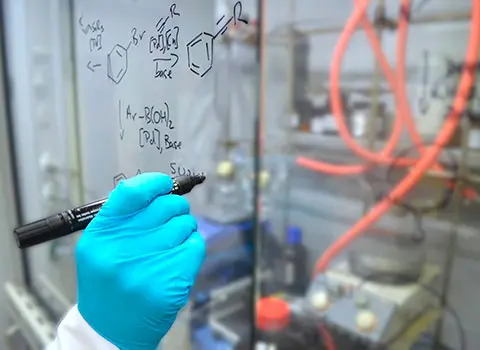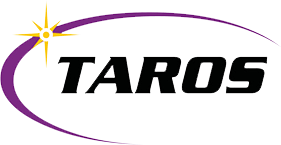CARDIOMYO Eurostars Grant
Taros , ZeClinics, Amsterdam UMC and join forces to boost drug discovery for cardiomyopathies
Dortmund, July 2021 ++++
CARDIOMYO is a European consortium project to accelerate cardiomyopathy drug discovery. The consortium has been granted with a budget of EUR 2,4 million from the prestigious EUREKA–EUROSTARS innovation program.
Taros Chemicals adds considerable value to the project with its outstanding synthetic chemistry and medicinal chemistry expertise. The collaboration is led by the spanish CRO ZeClinics, a leading expert in drug discovery in zebrafish. Amsterdam University Medical Centers (Amsterdam UMC) brings in its expertise human iPSC cardiomyocytes and cardiomyopathies.
The project will benefit from the collaboration between academy and industry by:
- Summing up expertise, assets and knowledge along the process (disease, targets, assays, drug screening, drug synthesis, compound libraries)
- Bringing together cutting-edge technologies (CRISPR/Cas9 genome editing, automatized screening systems in vivo and in vitro, medicinal chemistry, computational chemistry and molecular modeling, patient-derived human induced pluripotent stem cells)
The grant will allow the consortium to:
- Generate novel cardiomyopathy disease models
- Develop an innovative HTS drug discovery platform
- Screen and validate new cardio therapeutics to treat hypertrophic and dilated cardiomyopathies
Disease background
Cardiomyopathies are heterogenous heart muscle diseases and the leading cause of heart failure afflicting up to 65 million people worldwide. Amongst the most common forms of cardiomyopathies are the hypertrophic cardiomyopathy (HCM) associated with left ventricle muscle enlargement and thickening; and the dilated cardiomyopathy (DCM) where the cardiac chambers dilate and the heart cannot pump the blood efficiently throughout the body. HCM and DCM are the most common form of inherited cardiomyopathy (around 1 out of 500 people in the general population) and an important cause of morbidity in young adults. Multiple genes and mutations have been identified and were shown to be associated with the development of HCM or DCM leading to a better understanding and genetic diagnosis of the disease.
However, discovery of new cardiac therapies has been challenging, lengthy, costly and often associated with a considerable lack of success in bringing new drugs to the market due to safety issues and lack of predictability in the early phases of discovery. To date, most cardiomyopathy treatments rely on repurposing heart failure drugs to reduce symptoms and limit adverse effects.
The CARDIOMYO project
CARDIOMYO provides innovative, multifaceted approaches that could accelerate the access of patients to new and efficient treatments.
The CARDIOMYO consortium’s goal is to develop an integrated platform that allows the screening of hundreds of compounds in cardiomyopathy disease models that recapitulate the most characteristic features (phenotypes) of human DCM/HCM to identify potential therapeutic agents.
AUMC are world-renowned scientists in cardiovascular physiology, cardiomyopathies, heart failure and modeling of cardiac diseases and will generate genetic models of DCM and HCM in human iPSC cardiomyocytes. Those models, together with the generation, by ZeClinics, of genetically modified cardiomyocytes in living zebrafish using the state-of-the-art CRIPSR/Cas9 technology, represent an innovative and combined approach to accelerate drug screening and to increase predictability and translatability to human.
The CARDIOMYO screening platform will allow large-scale assessment of compounds by capturing physiological relevant parameters associated with human cardiac function such as contractility and electrophysiological recordings in vitro. ZeCardio®, an automated imaging platform with a custom-analysis software developed by ZeClinics can measure cardiac functional parameters in living zebrafish such as heart rate, ejection fraction, chamber diameter but also arrhythmias, conduction abnormalities or QT prolongation, a biomarker to detect pro-arrhythmic drugs.
Phenotypic-based screenings (assays based on the drug capacity to modify the cardiomyocyte biological activity) performed in vitro using hiPSC and in vivo in zebrafish larvae permit to identify molecules that are biologically cardio-active and able to revert the cellular damage caused by cardiomyopathies (“hit” compounds).
Integration of in vitro human iPSC and in vivo zebrafish into one versatile screening platform speeds up the identification of new molecular entities and repurposing of existing molecules. Following the screening of 300 compounds in HCM/DCM hiPSC cardiomyocytes by AUMC, the most promising “hit” compounds will be validated by ZeClinics in the zebrafish genetic models of DCM/HCM.
The zebrafish model is an excellent and predictive model to assess biosafety in living animals before “hit” compounds (with the desired activity) to further phases of development.
Hit compounds will feed in a series of key optimization steps led by Taros to produce – synthetize – new chemical entities that should be potent (have a strong cardioprotective effect), not toxic and present all the physicochemical properties that will make it a good candidate drug to be administered to humans (solubility, absorption, stability, permeability).
About Taros Chemicals
Taros is a privately owned discovery chemistry company, working with global pharmaceutical, biotech and chemical companies since 1999. Alongside our performance chemicals and material science division, Taros’ drug discovery mission is to create drug candidates as potential new medicines. Taros has a strong scientific track record on many biomolecular targets in all main therapeutic areas and thereby adding considerable value to collaborations from target validation and hit identification to lead generation and optimization. Taros’ core expertise ranges from custom synthesis and process development to modern medicinal and computational chemistry, as well as compound library design and production.
Taros was heading the chemistry efforts of the EUR 196 million funded European Lead Factory (2013-2018) and is currently heading its EUR 36.5 million funded continuation (2019-2022). Moreover, Taros is deeply engaged in other research alliances like the EUR 11 million funded Drug Discovery Hub Dortmund.
Press Contact:
Youri R. Mesmoudi, Executive Vice President,
Contact form
Acknowledgement of support
This project has received funding from the Eurostars-2 joint programme with co-funding from German Federal Ministry of Education and Research (BMBF) and the European Union Horizon 2020 research and innovation programme.
Drug Discovery
Taros’ international and multidisciplinary team has more than 180 years of pharmaceutical R&D experience. Collectively as a team, we worked on more than 120 biomolecular…

custom chemical services
Custom Synthesis
We support our customers by providing first kg quantities of fine and specialty chemicals, cost reduction of existing syntheses, streamlining chemical processes considering…

